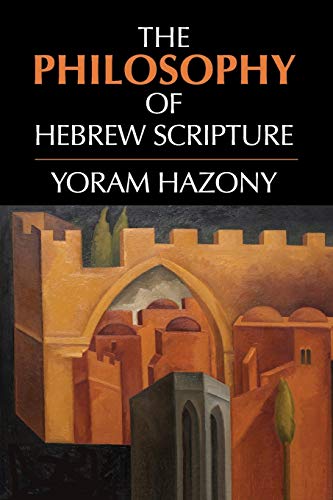The Philosophy of Hebrew Scripture / Hazony, Yoram
| List Price: | |
Our Price: $32.99 | |
|
For Bulk orders
| |
|
Used Book Price: | |
| The Philosophy of Hebrew Scripture / Hazony, Yoram | |
| Publisher: Cambridge University Press | |
| Availability:In Stock. | |
| Sales Rank: 485733 | |
|
Things You Thought You Knew About the Bible
- People say that Bible is about obeying God s commands. But biblical figures such as Moses, Aaron, and Pinchas disobey God and are praised or rewarded for it.
- People say Abraham was praised because of his willingness to sacrifice his only son on an altar. But Abraham never decides he will sacrifice Isaac. He believes God will back down, and the Bible tells us so explicitly.
- People say that the biblical heroes are mostly men. But the Bible goes out of its way to emphasize that no fewer than five different women risked their lives in the struggle to save the infant Moses, suggesting that without every one of these women the Jews would never have left Egypt.
- People say the Bible is about faith as the ultimate value. But the law of Moses includes no commandment to have faith, and the Bible tells us that Moses himself was unable to attain a perfect faith in God.
- People say that God calls himself I am that I am at the burning bush, implying (as tradition has it) that he is perfect being, eternal and unchanging. But the original text actually says the opposite of this: In Hebrew God says I will be what I will be, suggested that God is not perfect but rather imperfect and changing.
- People say that the biblical kingdom of the Israelites was destroyed because it turned to idolatry. But the fall of the kingdom begins with Solomon, his inability to control his desire for big armies, women, and gold, and the ruinous taxation and enslavement of his people that result from this.
- People say the story of Cain and Abel is about hatred between brothers. But Cain and Abel aren t just any brothers. They stand for conflicting ways of life the life of the farmer vs. that of the shepherd. Abel is just the first in a line of biblical heroes (including Abraham, Jacob, Moses and David, and more) whom choose the life of the shepherd and what it represents and so win God s love.
An Interview with Yoram Hazony
Yoram, why did you write The Philosophy of Hebrew Scripture?
Hebrew Scripture is an intensely personal subject for me. In some ways, I feel a very deep sympathy for biblical figures like Jeremiah and Ezekiel. These are people who saw the destruction of their nation with their own eyes something that we can hardly even imagine. The Hebrew Bible is the record they left us of what this unimaginable catastrophe, and of the lessons they thought future generations should learn from it.
I think that when someone leaves you a record like that, it s a very special thing. These people sent us, you could say, a message in a bottle, telling us what happened to them. This bottle contains all their most intimate suffering, but also their reflections and ideas ideas they thought we d need so that we d remember and not make the same mistakes ourselves. But today for all sorts of reasons we ignore that message. For most people the Bible is just a closed book.
And this is something I find very painful. I put myself in their place and think: How would they feel knowing that we today receive that message in a bottle that we hold it in our hands and say to ourselves: What these people had to say is just not something I m interested in taking seriously. We turn our back on them. We re deaf to their cry.
It s been about twenty-five years now since I first understood that this is what was happening. I almost feel that I owe it to them, to the people who put that message in a bottle after what was really something like a Shoah for them, like the end of the world for them. I want to help people be able to hear their voices again. That s how I came to this.
So you almost have a sense of mission about this about bringing the Hebrew Bible to a place of respect among people who find it difficult to appreciate its power and importance today?
That s exactly right. I do feel that. I ve found that people who can bring the Bible to life for modern educated people are surprisingly rare. It s something it turns out I can do well. I speak before audiences about the Bible and they sometimes sit for hours asking me to tell them another Bible story and then another so that they feel they make sense, maybe for the first time. If that s what people want me to do, I feel I don t have a right to turn that down. It s really a kind of a calling.
When did you begin to feel this way?
It happened in graduate school. I went back to graduate school to study political thought and philosophy subjects I m embarrassed to say that I simply missed as an undergraduate. So there I was in a Ph.D. program studying Plato and Hobbes and Nietzsche for the first time in a serious way. I loved the subject and I loved my instructors.
But almost from the first moment I kept having this feeling as I was reading these books: Well this sounds just like Hebrew Scripture! It s dealing with the same questions sometimes giving similar answers and sometimes different ones. But the biblical answers are as good as the ones we find in the other big books of the Western tradition. So why isn t the Bible part of the story? Why do we study the great books of the West but exclude the Bible?
I asked my instructors about this and they were actually extremely supportive. They told me that I might be right to feel uncomfortable, and encouraged me to write my doctoral dissertation on the political philosophy of the book of Jeremiah, which I finished in 1993. I think it was one of the first dissertations on a subject like that, although since then there have been many others. Parts of that dissertation are appearing in published form for the first time in this new book The Philosophy of Hebrew Scripture.
Do you think it matters much whether university programs teach Bible as part of what they study? Aren t the universities detached from what most people think?
Yes, I think it matters immensely. People think of the universities as an ivory tower disconnected from the normal lives that regular people lead. But this is a mistake. The universities play a very important role in modern society: They define the range of legitimate belief on almost every subject they deal with. If the universities decide that dinosaurs were warm-blooded and hopped like birds, then all the dinosaur books we had when we were kids get thrown out and replaced by new ones. And if the universities decide that most of the universe is made of dark matter that can t be detected by any instrument, then this is what most people think you should probably believe, even if ten years earlier people would have said that was ridiculous.
The same is true for the Bible. If the basic view that s accepted in universities is that what s in the Hebrew Bible just isn t worth taking seriously that it s not worthy of being studied sympathetically and with respect like other classic works of philosophy or political thought, then that s pretty much what educated everywhere are going to end up thinking.
Then it ends up being the case that the schools don t really teach Bible and it s not really the subject of discussion in any other cultural setting either. The view of the professors ends up being a kind of semi-official opinion that s accepted throughout society. Of course there are religious folks who think the Bible is worth reading but they end up being seen as oddballs for it. There s just this feeling that you can t be really impressed and exciting by the teachings of Hebrew Scripture and still be a reasonable person.
And you d like to see a change in that?
I think it s desperately needed.
Why?
You know, I can t say it better than this young woman I met at an airport in the UK last year. I was on my way to Scotland and she was coming from Ireland and on her way to Israel she was getting onto a plane I had just gotten off of. It was her second trip. She told me her husband hadn t wanted to go so she was going alone. I asked her why it was so important for her to go, since she wasn t a Jew. She said to me: I can t explain exactly. But I know that going back to the Bible is going back to the root of everything. It s who we are.
I think this young Irishwoman had it right: The Hebrew Bible is who we are, and what we are.
People who don t know how to approach the biblical texts simply don t realize the degree to which what is written in them defines us: What we think about and how we think about it. A lot of things we believe are modern are actually biblical in the most obvious sense but if you don t know the Bible then you think it was made up by someone recent.
I think this disconnection of modern people from everything having to do with their roots is difficult on the individual level and might even be dangerous on the level of nations. When you re cut off from your roots you often come to feel an ache and an emptiness that you can t explain. And often enough that vacant space ends up getting filled with all sorts of crazy things, with fascism and communism being just two obvious examples of what the world looks like after all the roots have been torn out.
But isn t that a process that s already very far gone. Is there really any hope of going back?
I really don t know. I look at the way the European nations are tearing up and discarding everything they once were, and I do wonder. Countries like Holland and Britain were nations formed by the Bible and especially by the Old Testament part of the Christian Bible. But then I meet people like this woman from Ireland, and it makes me think maybe something could change.
Now you can buy Books online in USA,UK, India and more than 100 countries.
*Terms and Conditions apply
Disclaimer: All product data on this page belongs to
 .
.No guarantees are made as to accuracy of prices and information.










